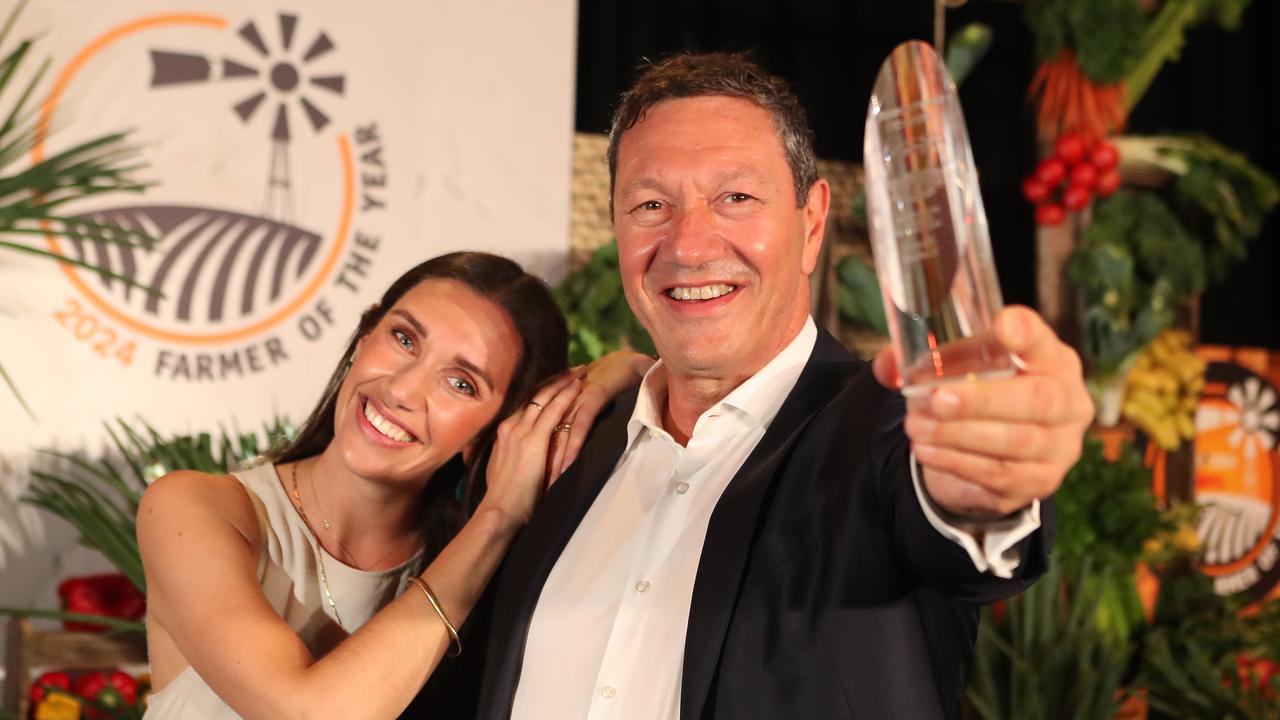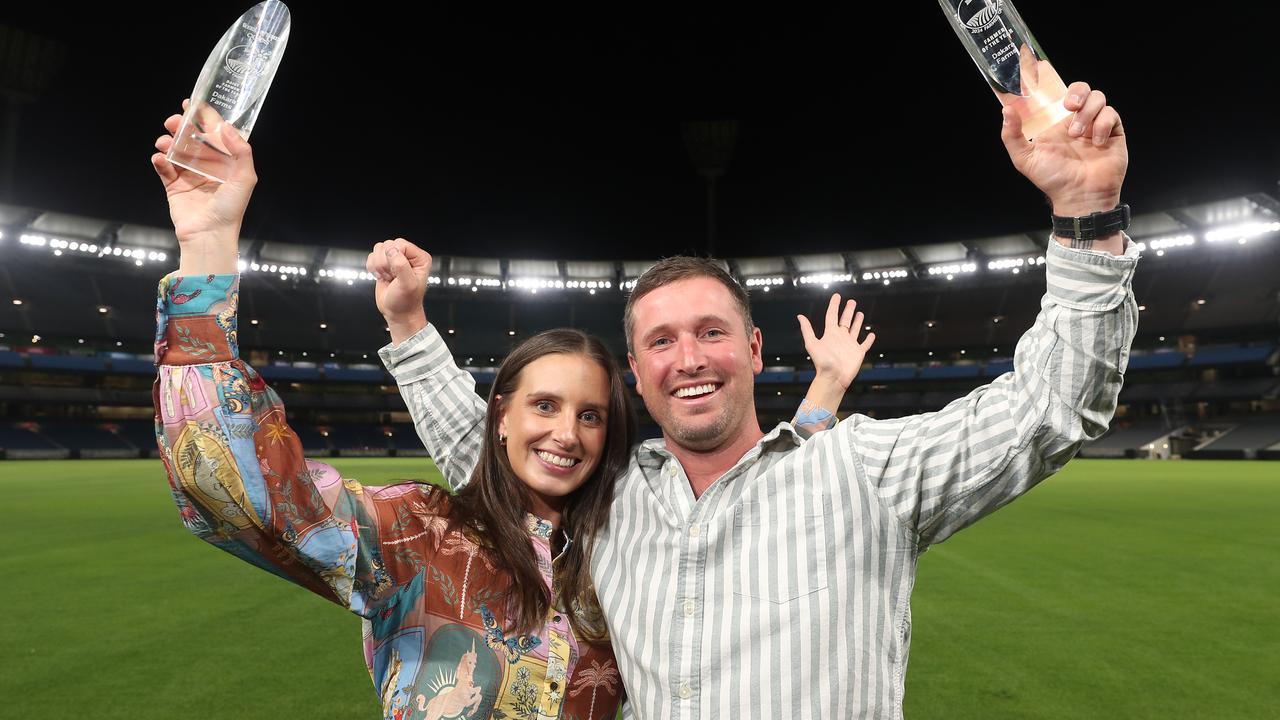Move from sugar cane to sweet potatoes a delicious victory
THE switch to horticulture has worked a treat for two former sugar cane growers, writes JOHANNA LEGATT.
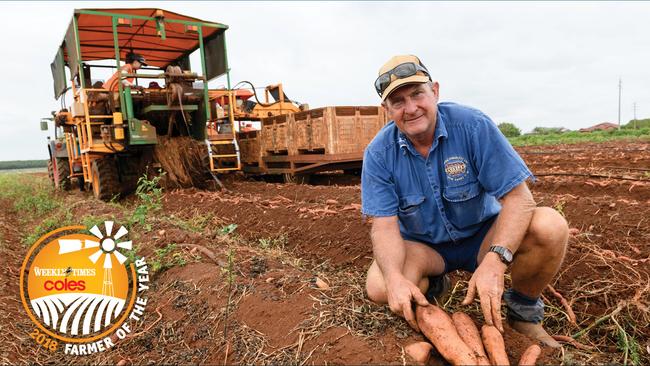
QUEENSLANDER Darren Zunker has been growing sweet potatoes for a good two decades now, but he remembers the sugar cane nightly burn like it was yesterday.
“I am a fourth-generation sugar cane farmer so there is sugar in my veins,” Darren said.
“Dad was harvesting and then I bought my own harvesting contract when I was 17, and I used to cut 37,000 to 40,000 tonnes of crop a year.”
MORE FARMER OF THE YEAR:
HOW TO IMPROVE ON-FARM EFFICIENCIES: CRYSTAL BROOK FARMER ANDREW SARGENT TELLS
WILLSWOOD FARMS COUNTS ON SHEEP TO MAKE TOP DOLLAR
HOW TO BREED FOR MARBLING IN LAMB: KINROSS HAMPSHIRE DOWNS AT HOLBROOK THE TOP OF THE CHOPS
In those days, the cane was prepared for harvest through controlled burning, which was not without a degree of risk.
“We used to burn cane whether the winds were blowing or not, and we had to get out there and put dummy breaks in,” Darren said.
“We had a crew of eight to 10 of us, which included a couple on water carts and a couple to watch out for the embers, or flyers as they were called, that carried on the wind.”
While it was a natural progression for Darren to follow in his father’s footsteps, he and his wife, Linda, found the full-time sugar cane business tough going.
“
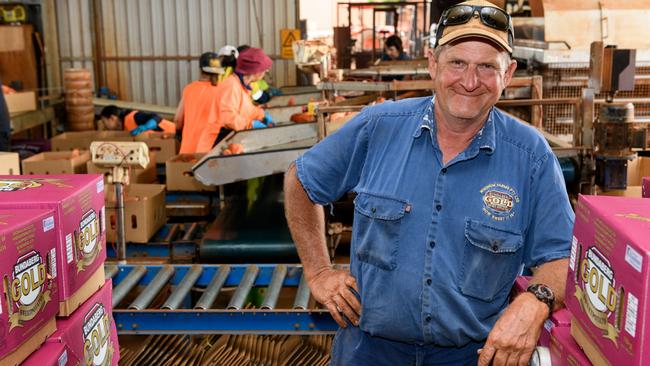
I did about two or three years of green cane harvesting on about 50 acres (19 hectares), but we called it poverty grass because it kept you poor,” Darren said.
“By the end of the sugar career we were growing it, we were harvesting it, we were doing the whole thing to try and keep the efficiencies up.
“But it was tough. The sugar prices were such that one year you would have a really good year and the next it was terrible.
“Then the diseases came through, like orange rust, that devastated crops.
“When the crushing finished, I would go and work for my neighbour who grew potatoes just to supplement the income.
DARREN AND LINDA ZUNKER
WINDHUM FARMS
GROWS five different varieties of sweet potatoes
FOCUS on the premium-grade Bundaberg Gold and Hummock Road produce
SENDS more than 100 pallets of product across Australia each week
ALSO grow sweet corn, watermelons and macadamias, across five farms with a total farm production area of 200ha
HARVEST REWARDS
THAT was where the fortuitous idea for sweet potatoes came in, which turned out to be a much more rewarding — and sustainable — business model.
“We phased out the sugar gradually, sold our sugar cane harvesting contract, and moved progressively into horticulture,” Darren said.
“Our first couple of harvests were not great, but we joined the Australian Sweet Potato Growers association and met some fantastic people.
“We thought, ‘Well, we only have to do a pallet a day and we can make a living’.”
It wasn’t long before Darren and Linda were moving about 25 to 30 pallets a day on their Windhum Farms property, which is located halfway between Bundaberg and Bargara in an area of Queensland better known for its sugar cane and rum.
The couple grows a range of sweet potatoes, with a clear focus on the premium Gold varieties, and their farm is located at the foothills of an extinct volcano. The Zunkers said the rich volcanic soils combined with the fresh clean sea air and mild climate made their farm one of the world’s most ideal places to grow sweet potatoes. They use variable-rate spreading technology, efficient irrigation methods and give their paddocks an 18-month break between sweet potato crops to aid soil health.
“We are doing cover cropping, using composts, and obviously looking after the ground through spelling,” Darren said.
“I make sure I look after my soils and it pays off in the quality we now produce.”
That’s not to say it has always been smooth sailing. In the early days, for example, Darren and Linda had to work hard to attract quality agents to sell their sweet potatoes.
“We made sure we picked our quality up by visiting a couple of top growers and we saw they were really putting out a beautiful sweet potato,” Darren said.
“And I looked at Linda and said, ‘Girl, we got to pull our finger out here’.”
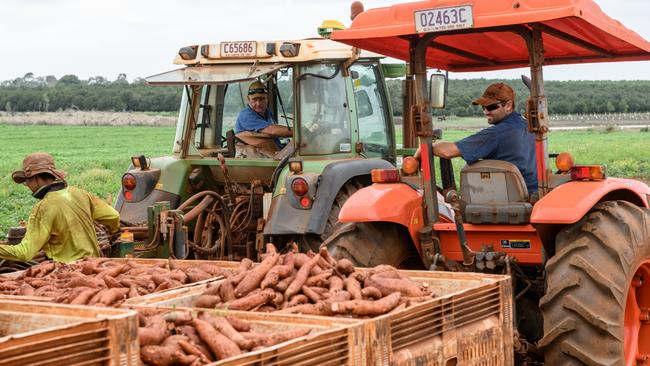
BACK TO BASICS
TO ensure a great-quality sweet potato, the pair went back to basics and that meant focusing on the seed.
“Initially, we would cut some tips from the neighbour and plant that, but the problem was there was a bit of virus in it so we couldn’t pull that good-quality potato out of the ground,” Darren said.
“So we had to start buying in the seed. We used to get two 18kg boxes of seed and that gave us better quality-shaped spuds.
“We also monitored our pests and diseases, and once we got that under control, yield and quality picked up.”
Most recently, Darren conducted research into viable horticultural markets for diversification, and added some sweet corn to the mix, and identified an opportunity to grow watermelons.
“When the Northern Territory market drops out, there is a small window that gives us an option to grow watermelons,” he said.
“We plant between 16 and 24 hectares each year depending on what land is available.”
About a year ago, the couple also expanded into macadamia nut production, with about 80ha planted.
“We looked into macadamia nuts based on the potential for robotics to make it a very effective horticultural crop,” Darren said.
“We were told by experts that in five to seven years’ time, robotics would become very strong
“That really appealed to me. We plant everything with GPS so we could easily incorporate robotics for spot spraying, and so forth.”
PITCH IN
THERE are five full-time workers on the farm, which grows product year round, as well as 10 casuals or backpackers.
“We work out in the paddock with the boys and Linda is packing in the shed when she is not handling marketing,” said Darren.
“So we all pitch in. We have a standard now and we want to keep it.”
Windhum Farms supplies more than 100 pallets of sweet potatoes to all the major vegetable wholesale markets across Australia through merchants in Brisbane, Sydney, Melbourne, Adelaide and Perth.
At some stage, however, both Linda and Darren will back off from the business, with their two boys, Ethan, 24, and Daniel, 21, starting to take on the reins.
“We will monitor the business, don’t get me wrong, but we will gradually let the boys come in and set a standard like we did,” Darren said.
And while sugar still pumps through his veins, Darren has no regrets about moving into sweet potatoes.
“Don’t get me wrong the sugar industry is a good lifestyle,” he said.
“But we had prices that were down, diseases and dry periods.
“It was a struggle, and we couldn’t seem to clear that mountain.
“So we had to get something that offered more consistent revenue, and sweet potatoes were just perfect to fill the gap.”

